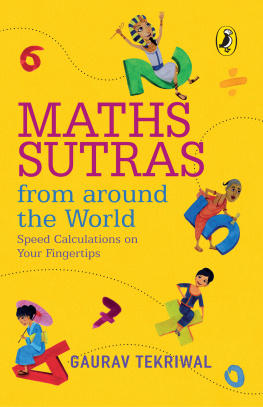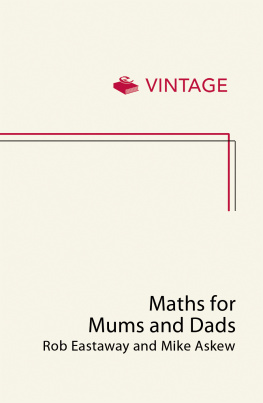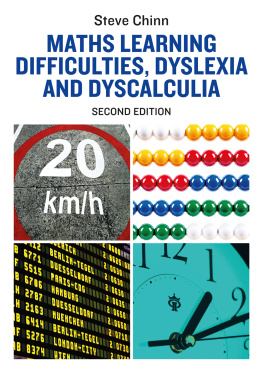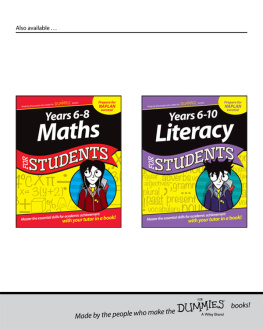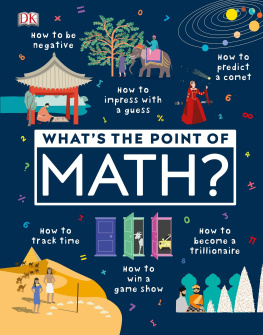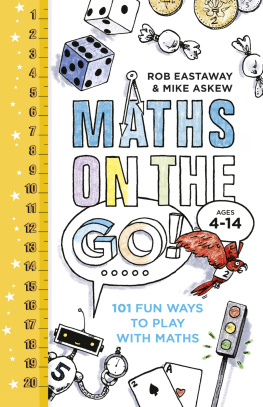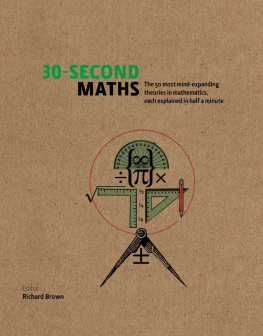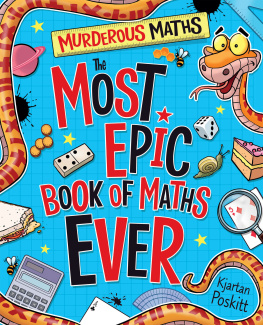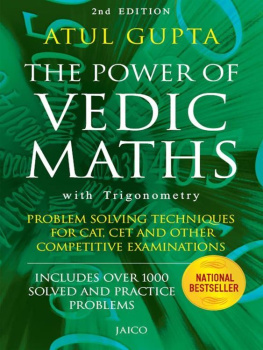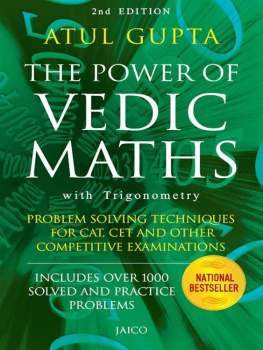The Math(s) Fix: An Education Blueprint for the AI Age Copyright 2020 Wolfram Media, Inc.
Wolfram Media, Inc. | wolfram-media.com
ISBN 978-1-57955-029-5 (hardback)
ISBN 978-1-57955-036-3 (paperback)
ISBN 978-1-57955-030-1 (ebook)
Education / Mathematics
Library of Congress Cataloging-in-Publication Data
Names: Wolfram, Conrad, author.
Title: The math(s) fix: an education blueprint for the AI age / Conrad Wolfram.
Other titles: Education blueprint for the Artificial Intelligence age
Description: Champaign : Wolfram Media, Inc., 2020. | Includes bibliographical references and index.
Identifiers: LCCN 2020007883 (print) | LCCN 2020007884 (ebook) | ISBN 9781579550295 (hardback) | ISBN 9781579550301 (epub)
Subjects: LCSH: MathematicsStudy and teachingTextbooks. | AMS: Mathematics educationEducational policy and systems.
Classification: LCC QA11.W68 2020 (print) | LCC QA11 (ebook) | DDC 510.71dc23
LC record available at https://lccn.loc.gov/2020007883
LC ebook record available at https://lccn.loc.gov/2020007884
Contents
Preface
Right at the centre of todays school curriculum is maths. Like it or loathe it, you cant avoid it. As we enter the Artificial Intelligence or AI age, pressure for school maths success has never been greater, because it seems so infused in the progress of recent decades, and promises of those to come.
And yet, I think school maths is nearing a cliff-edge. Implausible though it may seem, I believe todays mainstream subject, without reformation, will become a backwater for a few aficionados, and drop out of the mainstreama bit like the demise of Latin in UK or European schools. (Latin or, more generally, classics was often considered the intellectual bedrock of learning until the 1970s.)
This book is about what the problem is, how it came about and how it can be solved. It takes a cold, hard look at what maths education is and lays out what it should be, not only to keep up with AI, but to empower humankind for this upcoming era. I am a supporter for what maths education can be, but not for much of what it is today. For those who love todays maths, you may be disheartened by my criticisms. You shouldnt be. Careful but fundamental change will work to keep a renewed maths or new computational subject centre stage. For those who hate what youve seen of maths at school, I sympathise, but more usefully I hope this book may help you to understand what all the fuss was about, and how you can better partake in maths or be empowered by it. Part of my aim is to demystify this most abstract of subjects by providing the missing context that left so many asking, What the hells the point of learning this? at school, and decades later.
In the end, whether mainstream maths education lives, metamorphosises or dies isnt what should concern us. Student empowerment is. Whether we like maths the subject, what it stands for or how it operates, its a means to an end. Either maths education can truly serve the interests of most students or it has no place as a mainstream, enforced subject and, sooner or later, will not be.
How this plays out affects us, our children and society profoundly. Allow maths education to continue in its current mould, and we will increasingly remove most students opportunities for success in a wide range of fields: the AI age requires more, different, computer-augmented computational thinking for human empowerment, not more of the same maths. Fewer students will be equipped for the workplace or for life, a problem exacerbated by education authorities perplexed that more maths isnt transformative for more students. Left on its current path, reformation of maths education will eventually occur but only in a disorderly and highly disruptive way, having disadvantaged most of a generation along the way, increasing economic disparity and strife. Instead, actively reassessing mathsa hard but crucial transformation to a computer-based computational subjectwill put not only maths but education more generally on a far better trajectory for the AI age, or so-called 4th industrial revolution were entering.
There is good news for those who support maths and I hope will support the needed changes. The essence of the subject so revered by supporters is more important than ever. There is no reason why that should die. Indeed theres every reason why it should be more central, more revered and more liked. But were not there now; theres a lot of work required to effect this transformation. To secure its continued and renewed place as an anchor of intellectual as well as vocational education, maths education must take a fundamental look at what it is and how it operates, particularly now we have computers. Implying maths is good for you but Im not going to tell you why (explicitly or through flawed reasoning) isnt going to cut the mustard.
Todays maths education has become an unhealthy fixation for assessment, an addictive fix for policymakers to push, and therefore hard to fundamentally fix. I intended all these meanings in entitling this book The Math(s) Fix with a crucial extra one added: spelling out the solution, the fix in detail. Rather than just complain about whats wrong with maths or make todays maths seem more fun, as many books have, this one charts the solution that I and my team have spent recent years working out. We have done so from first principles and our experience at the epicenter of the use of maths for 30 years at Wolfram Research. Its for this reason you will see few citations in the book, but many acknowledgements to a very wide range of people for countless helpful conversations I have had on this subject.
I do not in any way underestimate the challenge in achieving this transformation. A worldwide shift is required. The educational ecosystem must be perturbed, new truisms established. The transformation I argue for involves the remodelling of a key facet of a core pillar of education, a fundamental shape change vitally needed because we are now in an era of machines that increasingly share intelligence with us. But rather than let this dawning reality (with damage thats already evident) simply shake the kaleidoscope of education, with pieces slowly landing where they will, I proactively order them to set us on the path for the best results.
The first countries or jurisdictions that proactively rise to this challenge will see the biggest benefits, rather like early adopters of universal education in the 19th century. It will seem a risky change for those involved, though in fact the risks of not changing will end up much higher. The potential rewards of success are massiveno less than the key building blocks for transformation to a Computational Knowledge Economy, where the combination of artificial and human intelligence is optimised.
Todays ecosystem of education doesnt easily support such subject change. From assessments tied to todays subjects, to too short a time horizon, to evidence-led innovation rather than innovation-led evidence, theres everything to prevent core subject change and seemingly nothing to promote it. Except, eventually, after much disarray, cold, hard failure.
This book will address all of these issues: the why, what, when, howfrom redefinition to roadmap. I attempt to run the full gamut of a fundamental change to our core computational school subject considering no less than the need for dramatic change, exactly what the change should be, what the new subject looks like, outcomes its tethered to (including the best way to represent thinking), how to implement it in todays classrooms, test it, and form ideas on the politics of making the change. Along the way I have had to span topics as broad as the purpose of education, to topics that detail practical delivery of materials. Does it apply at all stages of schooling? My answer is yes, but because maths education estrangement from the real-world increases through the years of school, this book hones in on the secondary level.


